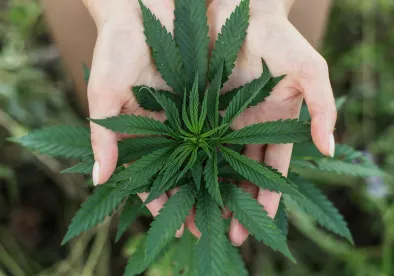Delta-8 THC
The United States Court of Appeals for the Ninth Circuit recently shed light on the legal status of the hemp-derived cannabinoid known as delta-8 tetrahydrocannabinol (“delta-8 THC”) and its implications for cannabis brand owners. Delta-8 THC is a psychoactive compound typically manufactured from hemp-derived cannabidiol. The compound is similar in effect to delta-9 THC, the primary psychoactive agent in marijuana, though delta-8 is found in the Cannabis sativa plant, which encompasses both hemp and marijuana. In 2018, the Farm Act legalized both the cultivation and the possession of hemp; the only statutory metric for distinguishing controlled marijuana from legal hemp is the delta-9 THC concentration level.
In the case of AK Futures LLC v. Boyd Street Distro, LLC, the Court held that AK Futures’ possession and sale of delta-8 THC products are permitted under federal law, meaning its brand used in connection with these products may be entitled to federal trademark protection.
AK Futures LLC v. Boyd Street Distro, LLC
Plaintiff AK Futures LLC produces and distributes e-cigarette and vaping products, including delta-8 THC goods, marketed under its “Cake” brand. In the suit, which alleged trademark and copyright infringement, the District Court for the Central District of California granted AK Futures’ motion for a preliminary injunction barring defendant Boyd Street Distro, a Los Angeles smoke product retailer, from selling allegedly counterfeit e-cigarettes and vaping products containing delta-8 THC and bearing AK Futures’ Cake trademark and copyrighted logo. The District Court determined that AK Futures had impliedly met the standard for ownership of a valid trademark and concluded it was likely to succeed on both its trademark and copyright infringement claims.
Boyd Street appealed the District Court’s determination that AK Futures’ delta-8 THC products were lawful under federal law. The United States Court of Appeals for the Ninth Circuit affirmed the District Court’s ruling that AK Futures’ delta-8 THC products are lawful under the “plain and unambiguous” text of the Farm Act and are eligible to receive trademark protection.
Observing that the relevant portion of the Farm Act removes “hemp” from the definition of marijuana in the Controlled Substances Act, the Court noted that the delta-9 THC concentration level was the only statutory metric for distinguishing marijuana from hemp and that the terms “derivative, extract, or cannabinoid” were substantially broad. The Court concluded that the delta-8 THC in AK Futures’ e-cigarette liquid fit comfortably within the statutory definition of “hemp,” defined to encompass the types of products that contain no more than 0.3% delta-9 THC on a dry weight basis. Since AK Futures’ products met that standard, they are lawful, and their sale may give rise to federal trademark protection and priority in this case.
This decision certainly suggests a path to protection for cannabis brands. However, even if the United States Patent and Trademark Office (“USPTO”) elects to grant applications covering goods containing delta-8 THC, it could still deny those same applications based on other grounds, such as the Food and Drug Administration’s failure to approve ingestible cannabis products.
Bottom Line
The Ninth Circuit’s decision provides some clarity as to a path for brand protection and may signal a new frontier for cannabis businesses. Cannabis brands, which have long struggled to obtain federal trademark protection because the Lanham Act extends such protection only to goods that lawfully exist in U.S. commerce, are entitled to many of the same protections that more “traditional” products and brands enjoy. Products containing legal cannabinoids, like delta-8 THC, are eligible to obtain federal trademark protection.
Should this decision be adopted by the USPTO, it could offer cannabis brands increased protection that is not otherwise available for goods that contain more than 0.3% of delta-9 THC, as proscribed by the Controlled Substances Act. However, traditional cannabis products containing delta-9 THC remain unlawful under federal law and do not qualify for federal trademark protection.




 />i
/>i

